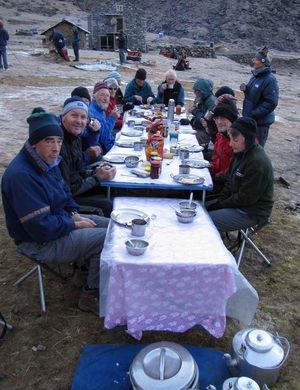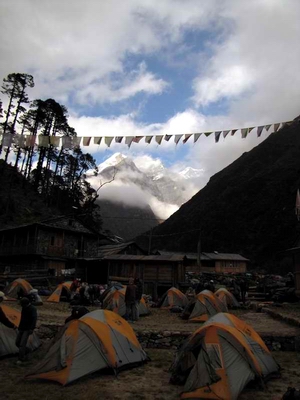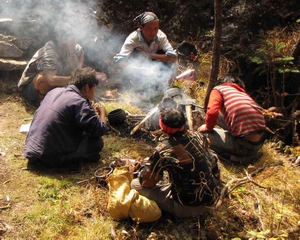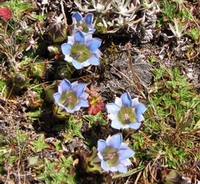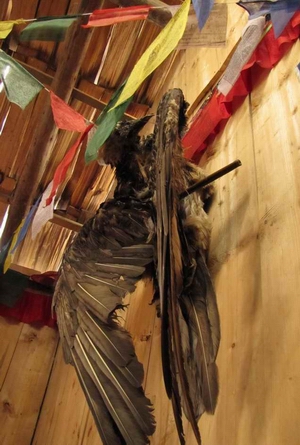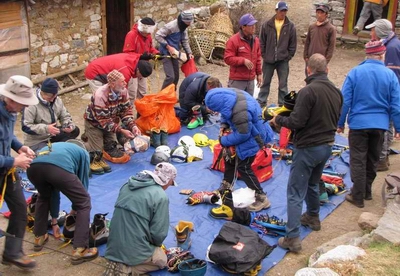Monday 19 October
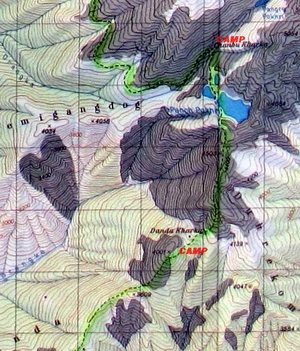
ones feet was essential.

Walking in North wales? |
Porters on the trail |
The site was in the bowl of a huge corrie with a waterfall cascading over dark rocks from a higher corrie. Above this corrie a snowy peak disappeared into the clouds. Spectacular! As it was only 12.30 when we arrived we were served with a welcome noodle soup, and then spent the afternoon reading, writing and washing clothes. Then the temperature began to fall, making the new after dinner ritual of filling our Sigg bottles with boiling water and stuffing them in our sleeping bags very welcome. It even began to snow and somehow, although it was only 19.30, we stayed in bed warm and cosy

Camp site in the corrie at Chambu Kharka |
Tuesday 20 October
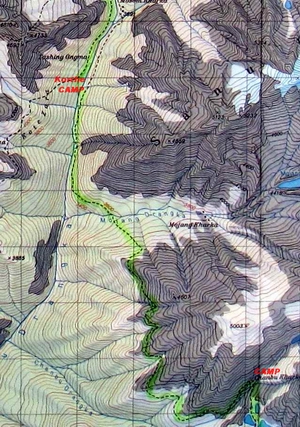
In the morning it was freezing outside and just 1°C inside the tent - our first really cold morning. Despite this the sherpas had taken the mess tent down, so we had to have an al fresco breakfast.
The cloud had gone, but the site was still in the shade; we watched the shadow on the hillside gradually shrinking, and we only had to walk for 10 minutes before we were in the full sun. The challenging Alpine style trail contoured around the mountainside high above the Hinku valley with extensive views, including back across the valley to the ridge we had descended four days earlier.
Eventually the path began to drop and the amount of rhododendrons increased until we were under the canopy of large rhododendrons and other trees growing amidst huge boulders. The path had a real jungle feel with mosses and epiphytes hanging from the trees. we were also getting hungry, having been getting used to lunch around 11.00 - and it was 12.30 and no sign of our large blue plastic sheet or the cook-boys. We had already passed a group of porters cooking up their lunch by the path.
Eventually we reached the valley bottom and began ascending the valley through the alluvial and morainic debris scattered above the torrent itself. Old tall pine trees, many dead, were growing here and there amongst the debris.
Chilly breakfast |
Hot orange squash time |
We were camping on a terrace between a couple of lodges, and had our meals in the lounge of one of them. The view from the terrace at sunset, with Mera Peak in the distance, was heart stopping - an unfortunate phrase as one of our group, Mike, decided he had to abandon the trek as he had notice irregularities in his heart beat and he suffers from high blood pressure in any case.
Camp site at Korthe |
Porters cooking their lunch |
Wednesday 21 October
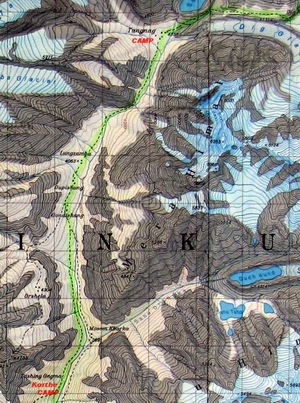
At times large alluvial fans spread out from the valley sides to join the chaos.
The shrubs gradually gave way to low down bushes of berberis, cotoneaster, juniper and willow interspersed with gentians and edelweiss.
The view up the valley to the peaks was spectacular and enjoyable once we had walked into the sun and peeled off several layers. The original itinerary included a side trip to the lake, Dudh Kund, below Mera Peak. However the trail & the village of Mosom Kharka, had been washed away in floods, so we carried straight up the main valley to an early lunch stop at Gondishang
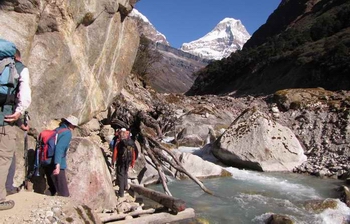
Picking our way up-river |
Gentians |
Spreadeagled in the monastery |
Another pattern established itself during the night - on the two to three occasions when I had to get up in the night to pee (one side effect of altitude & drinking lots to avoid dehydration) I would note the position of Orion as it spun across the sky - by the end of the trek I could almost tell the time by its position!
Checking kit |

